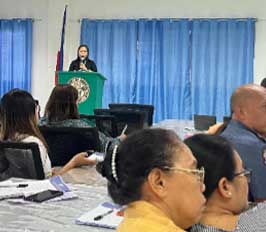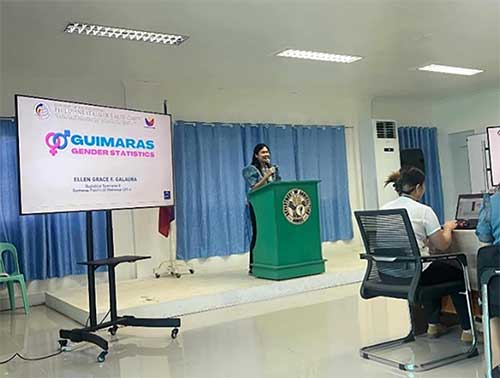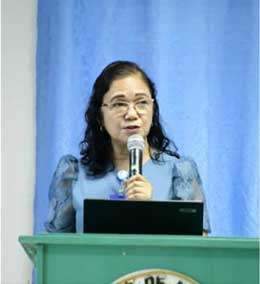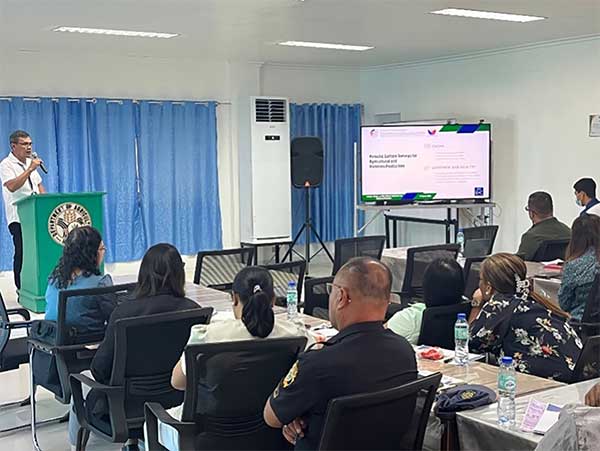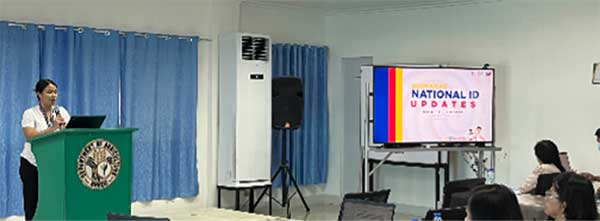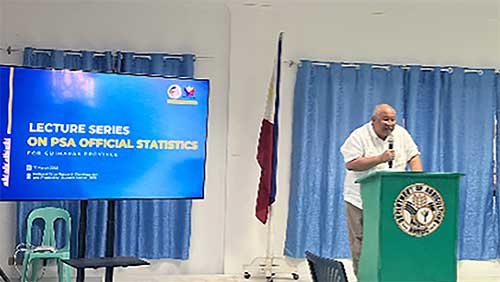The Philippine Statistics Authority-Guimaras held a lecture series on official statistics at the Guimaras National Crop Research Development and Production Support Center to highlight the role of data in local governance and economic planning.
“The lecture series was held Monday, March 17, 2025, and attended by members of the Provincial Statistics Committee, municipal civil registrars and staff, representatives from provincial offices, and Hon. Gov. JC Rahman Nava,” said Provincial Statistics Officer Nelida B. Losare.
“Their participation emphasized the province’s commitment to integrating statistical data into governance and policymaking,” Losare added.
Losare also underscored the importance of transparency in statistical reporting as a foundation for effective policymaking.
She emphasized that accessible, reliable, and timely data supports decision-making on social and economic issues.
Topics discussed included gender statistics, presented by Statistical Specialist II Ellen Grace F. Galaura, who shared insights on gender disparities in the province.
Vital statistics were covered by Statistical Analyst Lee Ariane Nicole G. Tejada, who detailed trends in births, marriages, and mortality.
Agricultural statistics were discussed by Supervising Statistical Specialist Vicente G. Geonanga, who shared data-driven perspectives on food security and agriculture.
Losare presented the February 2025 inflation report, analyzing economic trends impacting households and businesses.
Information Officer I Orlie E. Tabia gave updates on the Guimaras National ID rollout, discussing its benefits for residents.
Gov. Nava provided key insights, emphasizing the role of statistics in shaping policies, particularly in agriculture and fisheries.
He reaffirmed his administration’s focus on improving land productivity and lowering production costs.
Citing data showing a sharp decline in corn output in 2024, he said the upcoming agri-fishery village in Barangay Sapal, San Lorenzo, will help boost corn and crop production.
Nava also addressed the slower 0.6% inflation in February 2025, calling it a challenge to maintain.
He said the province must stabilize food prices, especially rice, by increasing the supply of high-quality local varieties preferred by consumers.
An open forum followed, with participants raising concerns about data accessibility and how statistics could improve governance.
A Guimaras Police Provincial Office representative asked why more women died than men, despite the male population being larger.
Tejada explained that mortality rates are influenced by factors such as health conditions, lifestyle, and access to care—not just population size.
A participant from Buenavista raised a similar question, prompting a discussion on gender-related health risks and access to healthcare.
Nava said lifestyle plays a role and identified ischemic heart disease as the province’s leading cause of death, stressing the need for health interventions.
A Department of Education representative asked how literacy rates are determined, which led to a discussion of census data and survey methods.
Galaura explained that basic literacy is the ability to read and write a simple message in any language.
She noted that functional literacy also includes comprehension and numeracy needed for daily tasks.
Losare added that PSA had completed the 2024 Functional Literacy, Education, and Mass Media Survey, with results set for release later this year.
Nava also raised concerns about divorce appearing in statistics, even though it is not legal in the Philippines.
He noted a high rate of common-law unions and questioned their impact on children.
Galaura said some divorces may be from marriages held abroad, where divorce was legally granted.
Losare explained that all five local governments are promoting marriage through free civil mass weddings, although some residents decline due to personal reasons or legal impediments.
Questions were also raised about the National ID system, such as what to do if a card is lost or if an agency rejects it due to the lack of a signature.
PSA-Guimaras clarified that while there are no formal guidelines for lost cards, residents can use the ePhilID or Digital National ID, which have equal validity.
It also reminded participants that refusing to accept the National ID is a violation, and such establishments may be reported.
PSA-Guimaras said it will issue a memorandum to businesses that reject the ID as valid proof of identity.
Questions about lost transaction slips and damaged ID photos were also addressed.
Tabia said those with peeled-off photos can visit the Fixed Registration Center in San Miguel, Jordan, for replacements.
While waiting, they may use the ePhilID or digital ID as valid identification.
PSA-Guimaras advised participants to check their National ID status and download the ePhilID at https://national-id.gov.ph.
They may also track card delivery through www.tracking.phlpost.gov.ph.
To generate a digital ID, users must provide consent, enter the required information, and download the eGovPH app.
Nava asked for data on the number of National ID and ePhilID holders in Guimaras, including how many have received physical cards.
He said the figures would offer a clearer view of provincial coverage under the identification system.
PSA-Guimaras responded that it will collect and analyze the data and issue a report on National ID ownership in relation to the province’s population.
The event closed with remarks from Geonanga, affirming PSA-Guimaras’ commitment to delivering accurate, timely, and relevant statistics.
“This lecture series would not have been successful without your participation,” Geonanga said.
“Through this, PSA-Guimaras continues to equip stakeholders with valuable statistical knowledge, supporting data-driven policymaking and inclusive growth.”

















